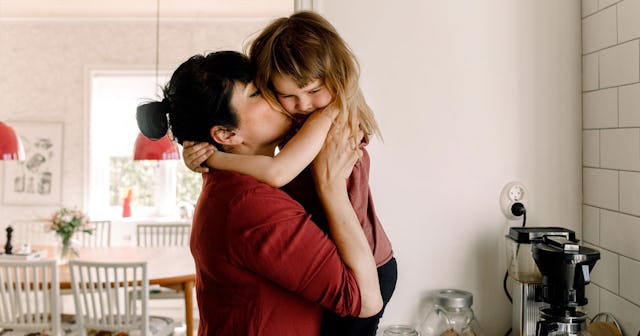My Daughter Is Autistic, And I Don't Need You To Regale Me With Your 'Motivational' Stories

Ever since my daughter was diagnosed with Autism Spectrum Disorder, folks are quick to tell me that they are sure she will “blossom” at any given moment. They talk about how they know an autistic person or are related to an autistic person who is exceedingly bright, far beyond that of the average person, and they act like that is supposed to make me hopeful or something. It’s always kind of a cliffhanger story, like they want me to know that soon my daughter will be experiencing the things they describe.
They mean well, I know. And truthfully, I share some of these same hopes (and more) for my daughter too. But autism isn’t just highly-intelligent kids with unique interests, and I’m tired of folks unknowingly projecting that stereotype onto my child and the autistic community.
We see stories of autistic people in inspirational movies and TV shows who use their unique minds in a way that moves humanity. We even read about famous historians with suspected autism, like Thomas Edison. That, or, we see another side of the spectrum where the represented autistic folks are nonverbal with dramatized characteristics. But, no matter what side of the spectrum mainstream media portrays, there is one thing we don’t hear or see enough of — people who are actually autistic.
We’re taking away the microphone from the autistic community and instead allowing a neurotypical person to stand in their place and say, “Let me explain what your autism can do for you,” and it’s ableist and absurd.
It feels like the only time we praise autism is when we can use its characteristics to benefit others. Or worse, it feels like autism is only acceptable when it’s barely noticeable, or the individual is as close to “normal” as possible. Oh, and it’s even better if they are believed to be the next Sheldon Cooper prodigy. It’s beyond offensive.
We want autistic people to be geniuses. I suppose that’s more interesting than a three-year-old having a sensory meltdown in the grocery store? But for so many kids, that is a part of their autism. Sensory processing disorders, verbal delays, communication disorders — these are all pieces of the puzzle that is autism and the challenges it can present. And I’d like to ask you to please look at all of them and be more mindful of your judgements.
Neno Gallery/Getty
What happens when you continually let neurotypical people speak on behalf of an entire community they aren’t a part of? Wrongly conceived ideas about what it means to be autistic. This is not affirming or validating for autistic folks. It’s actually dangerous.
The load we place on the shoulders of autistic children is twice the size of what we are asking neurotypical children to carry. Strangers aren’t coming up to parents of neurotypical children and saying, “My kid was just like your kid. She’s a motivational speaker now. I bet yours will be too.” For one, how awkward? And for two, someone else’s child doesn’t have anything to do with your own — this is no different when it comes to autistic children.
So if we are to create an inclusive space for people with autism and parents of autistic children, our decisions need to be informed by people who are autistic. We need to take a step back and look at the entire picture, not just the parts we find most interesting and “hopeful.”
Some autistic kids will never be able to communicate verbally. Some can speak to you in complete sentences far earlier than many of their peers — their differences do not negate their autism, only the level of support their autism may require. They are both equally autistic and do not need to carry a functioning label to receive dignity and respect.
My daughter may not be able to tell my husband or me that she is thirsty or hungry, but at almost four years old, she can fix any iPad after her siblings have screwed with the settings. She is cognitively delayed and nonverbal, but she communicates in her own ways. We have attended therapy several times a week for over a year, and we’ve worked tirelessly at home to figure out her preferred method of communication. We’ve shed our fair share of tears together when she desperately wanted something, and I didn’t know what that something was. And we’ve celebrated together when we finally figured it out.
I wish people knew that my daughter’s diagnoses aren’t the first thing I see when I look at her. I don’t feel sad or discouraged about who she is or who she will become. I don’t feel like she’s a superhuman, aside from all parents’ common bias for their children. And contrary to what feels like popular opinion, I don’t need an inspirational story to have a positive outlook about my child’s life.
She is who she is, and I love her entirely for it.
This article was originally published on